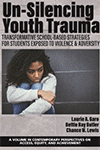
Un-Silencing Youth Trauma
Transformative School-Based Strategies for Students Exposed to Violence & Adversity
Edited by:
Laurie A. Garo, University of North Carolina at Charlotte
Bettie Ray Butler, University of North Carolina at Charlotte
Chance W. Lewis, University of North Carolina at Charlotte
A volume in the series: Contemporary Perspectives on Access, Equity, and Achievement. Editor(s): Chance W. Lewis, University of North Carolina at Charlotte.
Published 2022
Urban violence, poverty, and racial injustice are ongoing sources of traumatic stress that affect the physical, emotional and cognitive development and well-being of millions of children each year. Growing attention is therefore directed toward the study of child trauma and incorporation of trauma-sensitive practices within schools. Currently such practices focus on social and emotional learning for all children, with some in-school therapeutic approaches, and outside referrals for serious trauma. There is inadequate attention to racial injustice as an adverse childhood experience (ACE) confronting Black males among other youth of color. Although there are guidelines for trauma-sensitive approaches, few are culturally responsive. And it is now critical that educators consider the traumatic impacts of a dual pandemic (covid-19 and racism) on children and their education.
This timely book thus serves to inform and inspire transformative healing and empowerment among traumatized children and youth in pandemic/post-pandemic school and after-school settings. The reader will learn about trauma through actual experiences. Researchers and practitioners present approaches to healing that can be adapted to local situations and settings. The book consists of four parts: Youth Voices on Traumatic Experience; Trauma-focused Research; Culturally Responsive and Trauma Sensitive Practices; and Where do we go from Here? Suggestions for Next Steps. Each part contains a set of themed chapters and closes with a youth- authored poetic expression. The book is especially designed for those working in urban education. However, anyone whose work is related to traumatized children and youth will find the book informative, especially in a post-pandemic educational environment.
CONTENTS
Foreword, Cirecie West-Olatunji. Preface: On Trauma and Resilience: An Auto-ethnographic Reflection, Laurie Garo. PART I: YOUTH VOICES ON URBAN TRAUMA. The Urban Youth Voice: A Letter to My Teachers, Sydney Williams. From the Victim of Abuse: Breaking Our Trust vs. Breaking Our Silence, Sydney Williams. From the Voice of the Rape Victim: The Lost Child vs. the Lost Cause, Sydney Williams. Poetic Expression: Mask, Elizabeth Rainey. PART II: TRAUMA-FOCUSED RESEARCH. The Trauma Informed Classroom: What Every Educator Should Know, Paula Barbel. Expressive Arts as a Response to Adverse Childhood Experiences in Urban Communities, Sejal Parikh Foxx and Kristie Opiola. Stress, Resilience, and Empowerment: A Trauma-Informed Peer Mentoring Model for Youth of Color, Maryse Richards, Catherine Rice Dusing, Kevin M. Miller, Ogechi Onyeka, Amzie Moore, Jenny Phan, Dakari Quimby, and Katherine Tyson-McCrea. The Trauma-Sensitive Urban Educator Model: An Interdisciplinary Framework for Preservice Urban Educators, Jasmine Graham, Eric Kyere, and Tambra O. Jackson. Poetic Expression: Protest, Elizabeth Rainey. PART III: CULTURALLY RESPONSIVE AND TRAUMA SENSITIVE PRACTICES. Not the Brady Bunch: Three School-Based Strategies to Facilitate Post Traumatic Growth among Urban Families, LaTonya M. Summers. We Wear the Mask: Unmasking Racial Trauma through use of Spoken Word Poetry as a Therapeutic Tool, Tiffany Hollis. Mercy Me: Recognizing and Responding to Student Trauma Using Culturally Responsive Trauma-Informed Pedagogy, Bettie Ray Butler and Shanique Lee. Poetic Expression: God Colored on Me, Minea (Nea) Driver. PART IV: WHERE DO WE GO FROM HERE? SUGGESTIONS FOR NEXT STEPS. Rethinking Youth Trauma in Preparation for a Post-Pandemic Learning Environment: The Afterword, Bettie Ray Butler and Laurie Garo. Poetic Expression: Free, Prophet Tucker. About the Authors.
-
Paperback978-1-64802-877-9
Web price: $45.04 (Reg. 52.99)
-
Hardcover978-1-64802-878-6
Web price: $80.74 (Reg. 94.99)
- eBook978-1-64802-879-3

- EDU054000 - EDUCATION: Urban
- EDU038000 - EDUCATION: Student Life & Student Affairs
- EDU044000 - EDUCATION: Classroom Management
-
 Advancing Inclusive Excellence in Higher Education
Practical Approaches to Promoting Diversity, Equity, Inclusion, and Belonging
Advancing Inclusive Excellence in Higher Education
Practical Approaches to Promoting Diversity, Equity, Inclusion, and Belonging
-
 Developing Culturally Responsive Learning Environments in Postsecondary Education
Developing Culturally Responsive Learning Environments in Postsecondary Education
-
 Economic, Political and Legal Solutions to Critical Issues in Urban Education and Implications for Teacher Preparation
Economic, Political and Legal Solutions to Critical Issues in Urban Education and Implications for Teacher Preparation
-
 Imagining the Future
Historically Black Colleges and Universities - A Matter of Survival
Imagining the Future
Historically Black Colleges and Universities - A Matter of Survival
-
 Post-Secondary Planning for All
Approaches to College and Career Readiness Counseling for Special Populations
Post-Secondary Planning for All
Approaches to College and Career Readiness Counseling for Special Populations
-
 Preparing to Lead
Narratives of Aspiring School Leaders in a "Post"-COVID World
Preparing to Lead
Narratives of Aspiring School Leaders in a "Post"-COVID World
-
 Unveiling the Cloak of Invisibility
Why Black Males are Absent in STEM Disciplines
Unveiling the Cloak of Invisibility
Why Black Males are Absent in STEM Disciplines

